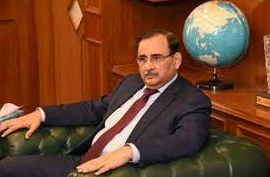Anjum Nisar wants revitalizing agri sector as yield lags behind global target
ISLAMABAD, APR 20 /DNA/ – The Federation of Pakistan Chambers of Commerce and Industry’s Businessmen Panel (BMP) has asked the government to revitalize agricultural sector through innovation and sustainable development as the production had fallen so low that Pakistan had become an importer, while neighbouring countries had progressed in crop yields, which is shameful for us.
FPCCI former president and Businessmen Panel (BMP) Chairman Mian Anjum Nisar highlighted that Pakistan’s per-acre agricultural yield especially for wheat, sugarcane, and cotton lagged behind global benchmarks due to poor seed quality, inefficient water use, and substandard agricultural practices.
He highlighted the need to increase both domestic and foreign investment in the agri-sector, while also strengthening the role of financial institutions and facilitating agricultural loans.
He called for a transparent regulatory framework with increased involvement of experts, farmers, and relevant stakeholders in policymaking processes to ensure long-term success.
Anjum Nisar said that Pakistan has fertile land, capable agricultural engineers, and hardworking farmers. Other than climate challenges, we have all the ingredients for success. Real growth and progress in this sector can only come through science-led strategies.
Anjum Nisar called for tapping into the talent of young professionals and researchers, while leveraging the wisdom of experienced experts to guide the process.
Referring to 65% of Pakistan’s rural population, he stressed the need to provide meaningful opportunities to rural youth, particularly in agri-tech and entrepreneurship.
He noted the absence of patronage for local agri-machinery manufacturers and service companies supporting small farmers, urging that these be brought into a systematic framework.
We must learn from past neglect and embrace a comprehensive, inclusive strategy to move forward,” he stated, lamenting the lack of off-season storage facilities and value addition plants that could create jobs and reduce food wastage.
He called for the formation of working committees on five critical sectors to submit actionable recommendations, as this should be chance to revive Pakistan’s agri-economy with the help of our young minds, scientific knowledge, and collective commitment. Let’s not waste any more time,” he said.
He agreed on several priority areas requiring urgent attention mainly technological integration as proposals were floated to improve digital access in rural areas through better smartphone and internet availability, creating a central database for farmers and incorporating blockchain and QR code systems for input delivery to boost transparency and efficiency.
He also emphasized on improving soil fertility and encouraging research to promote nutritious, high-yield crop production. Public-private training programs should be proposed to enhance farmers’ skills, whereas the participants stressed upgrading existing agricultural markets, developing new infrastructure, and ensuring widespread availability of modern equipment to enhance productivity.
He also highlighted that while some institutions are now producing agricultural machinery domestically, previous reliance on imports such as combine harvesters slowed progress.
He said that the government would prioritise feedback from stakeholders to shape a strategic framework aimed at improving agricultural output and resilience.
He particularly lambasted the bureaucracy’s past failures, pointing to poorly managed service companies meant to support small farmers that ended up doing little more than collecting dust. He also underlined the importance of promoting agricultural cottage industries, supporting small and medium enterprises (SMEs), and improving crop storage infrastructure.
“There is a clear gap in off-season crop storage and small-scale value-addition plants, he said, adding that these could generate employment opportunities for rural youth and boost exports.
He proposed targeted reforms, which include improved water management systems, promotion of nutrient-rich crops using modern scientific methods, expansion of public-private training programmes for farmers, digitisation of agriculture through enhanced internet access in rural areas and creation of a centralised database for farmers.
He also recommended focused research on soil fertility and modern extension services, while emphasising the need for mechanized farming and enhanced market infrastructure.
Improving access to agricultural finance and making institutional credit more accessible were also cited as priorities.
Businessmen Panel leader asked the government that its strategies should not only focus on short-term gains but also encompass a long-term vision for sustained progress, focusing the national economic agenda, giving priority to address the issues of trade and industry in consultation with the business community which is the key stakeholder.
Mian Anjum Nisar observed emphasised that such transparency from the government is crucial for instilling confidence in the business community and investors, as Pakistan, with all its resources and opportunities, cannot afford to continue to muddle through economically due to political polarisation. The FPCCI former president observed that Pakistan requires a political consensus on economic policy. Freeing the country from its economic calamities should not be a matter of party affiliation, but a common task for all political actors who want to see Pakistan flourish.
He observed that the country has had trouble raising enough money to cover its expenses. Due to the low tax-to-GDP ratio, borrowing and outside help are heavily relied upon to close the fiscal imbalance. There is a recurring budget deficit because the government spends more than it takes in. The national debt burden has risen, as a result, needing substantial financial resources for debt repayment. Both internal and external debt in Pakistan has been constantly rising.

















